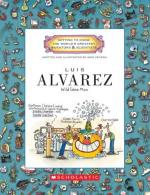|
This section contains 1,809 words (approx. 7 pages at 300 words per page) |

|
American physicist
Luis Alvarez proposed a controversial theory involving the possibility of a massive collision of a meteorite with the earth 65 million years ago, an event that Alvarez believed may account for the disappearance of the dinosaurs. After a varied and illustrious career as a Nobel Prize-winning physicist, Alvarez shared his last major scientific achievement with his son Walter, who was then a professor of geology at The University of California at Berkeley. In 1980, the Alvarezes accidentally discovered a band of sedimentary rock in Italy that contained an unusually high level of the rare metal iridium. Dating techniques set the age of the layer at about 65 million years. The Alvarezes hypothesized that the iridium came from an asteroid that struck the earth, thereby sending huge volumes of smoke and dust (including the iridium) into the earth's atmosphere. They suggested that the cloud produced by...
|
This section contains 1,809 words (approx. 7 pages at 300 words per page) |

|


